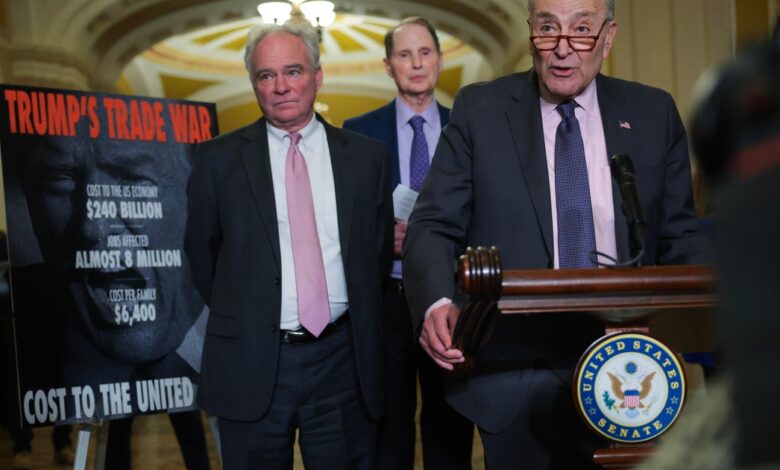Senate Democrats to force vote to block Canada tariffs as Trump puts pressure on GOP

The Senate is gearing up for a crucial vote on Wednesday that could potentially block tariffs on Canadian products set to take effect. Led by Democratic Sen. Tim Kaine of Virginia, the resolution aims to terminate the national emergency that President Trump is using to impose these tariffs, effectively preventing the sweeping levies on foreign imports. However, with the GOP-controlled House unlikely to take up the resolution, the vote may be largely symbolic.
The resolution would require the support of at least four Republicans in addition to the 47 Democrats and independents in the chamber for approval. Kaine expressed uncertainty about the outcome, noting that discussions and votes are still ongoing and unpredictable in the Senate.
President Trump initially threatened the tariffs on Canada and Mexico in January, citing border security and the need to curb the flow of fentanyl. While the tariffs have garnered support from UAW President Shawn Fain, economists have warned about potential price increases, leading to a retreat in financial markets as investors brace for the impact.
Kaine criticized the tariffs as “attacks on everyday people” and argued that the president’s justification based on a “made-up emergency” is unfounded. He emphasized that while fentanyl is a real emergency, it does not originate from Canada. The tariffs could impact various industries, including groceries, food products, building supplies, fertilizers, and materials for ships and submarines, potentially affecting U.S. national security.
President Trump urged Senate Republicans to support the national emergency and avoid giving Democrats a victory. He specifically called out Senators Lisa Murkowski, Susan Collins, and Mitch McConnell, along with Rand Paul, for their potential support. The president expressed concern about the resolution’s impact on the Republican Party and the United States.
In response, Senate Minority Leader Chuck Schumer encouraged Republicans to join Democrats in opposing the tariffs, labeling them as a “tax increase on American families.” He highlighted the president’s apprehension about the resolution and urged Senate Republicans to prioritize American families’ interests.
As the Senate prepares for the vote, the outcome remains uncertain, with both Democrats and Republicans engaged in discussions and negotiations. The resolution’s fate hinges on bipartisan support, as lawmakers navigate the complex dynamics of trade policy and national security concerns.





